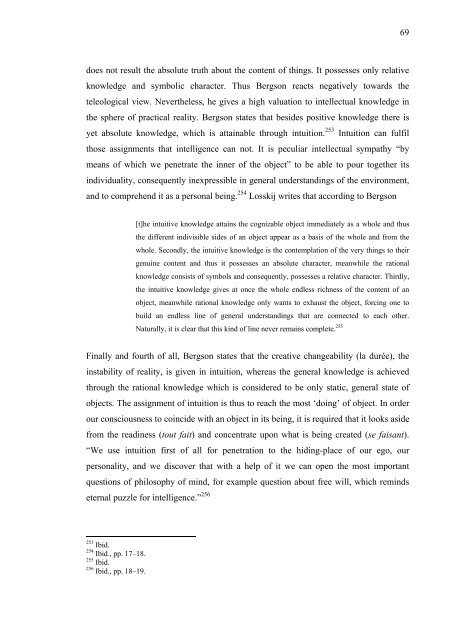Boris Asaf'ev and the Soviet Musicology - E-thesis
Boris Asaf'ev and the Soviet Musicology - E-thesis
Boris Asaf'ev and the Soviet Musicology - E-thesis
You also want an ePaper? Increase the reach of your titles
YUMPU automatically turns print PDFs into web optimized ePapers that Google loves.
does not result <strong>the</strong> absolute truth about <strong>the</strong> content of things. It possesses only relative<br />
knowledge <strong>and</strong> symbolic character. Thus Bergson reacts negatively towards <strong>the</strong><br />
teleological view. Never<strong>the</strong>less, he gives a high valuation to intellectual knowledge in<br />
<strong>the</strong> sphere of practical reality. Bergson states that besides positive knowledge <strong>the</strong>re is<br />
yet absolute knowledge, which is attainable through intuition. 253 Intuition can fulfil<br />
those assignments that intelligence can not. It is peculiar intellectual sympathy “by<br />
means of which we penetrate <strong>the</strong> inner of <strong>the</strong> object” to be able to pour toge<strong>the</strong>r its<br />
individuality, consequently inexpressible in general underst<strong>and</strong>ings of <strong>the</strong> environment,<br />
<strong>and</strong> to comprehend it as a personal being. 254 Losskij writes that according to Bergson<br />
[t]he intuitive knowledge attains <strong>the</strong> cognizable object immediately as a whole <strong>and</strong> thus<br />
<strong>the</strong> different indivisible sides of an object appear as a basis of <strong>the</strong> whole <strong>and</strong> from <strong>the</strong><br />
whole. Secondly, <strong>the</strong> intuitive knowledge is <strong>the</strong> contemplation of <strong>the</strong> very things to <strong>the</strong>ir<br />
genuine content <strong>and</strong> thus it possesses an absolute character, meanwhile <strong>the</strong> rational<br />
knowledge consists of symbols <strong>and</strong> consequently, possesses a relative character. Thirdly,<br />
<strong>the</strong> intuitive knowledge gives at once <strong>the</strong> whole endless richness of <strong>the</strong> content of an<br />
object, meanwhile rational knowledge only wants to exhaust <strong>the</strong> object, forcing one to<br />
build an endless line of general underst<strong>and</strong>ings that are connected to each o<strong>the</strong>r.<br />
Naturally, it is clear that this kind of line never remains complete. 255<br />
Finally <strong>and</strong> fourth of all, Bergson states that <strong>the</strong> creative changeability (la durée), <strong>the</strong><br />
instability of reality, is given in intuition, whereas <strong>the</strong> general knowledge is achieved<br />
through <strong>the</strong> rational knowledge which is considered to be only static, general state of<br />
objects. The assignment of intuition is thus to reach <strong>the</strong> most ‘doing’ of object. In order<br />
our consciousness to coincide with an object in its being, it is required that it looks aside<br />
from <strong>the</strong> readiness (tout fait) <strong>and</strong> concentrate upon what is being created (se faisant).<br />
“We use intuition first of all for penetration to <strong>the</strong> hiding-place of our ego, our<br />
personality, <strong>and</strong> we discover that with a help of it we can open <strong>the</strong> most important<br />
questions of philosophy of mind, for example question about free will, which reminds<br />
eternal puzzle for intelligence.” 256<br />
253 Ibid.<br />
254 Ibid., pp. 17–18.<br />
255 Ibid.<br />
256 Ibid., pp. 18–19.<br />
69

















